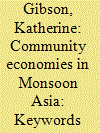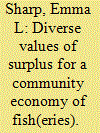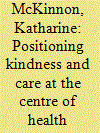| Srl | Item |
| 1 |
ID:
161582


|
|
|
|
|
| Summary/Abstract |
A diversity of place‐based community economic practices that enact ethical interdependence has long enabled livelihoods in Monsoon Asia. Managed either democratically or coercively, these culturally inflected practices have survived the rise of a cash economy, albeit in modified form, sometimes being co‐opted to state projects. In the modern development imaginary, these practices have been positioned as ‘traditional’, ‘rural’ and largely superseded. But if we read against the grain of modernisation, a largely hidden geography of community economic practices emerges. This paper introduces the project of documenting keywords of place‐based community economies in Monsoon Asia. It extends Raymond William’s cultural analysis of keywords into a non‐western context and situates this discursive approach within a material semiotic framing. The paper has been collaboratively written with co‐researchers across Southeast Asia and represents an experimental mode of scholarship that aims to advance a post‐development agenda.
|
|
|
|
|
|
|
|
|
|
|
|
|
|
|
|
| 2 |
ID:
185110


|
|
|
|
|
| Summary/Abstract |
This paper develops a diverse economies account of fish ‘waste’ that revalues it as ‘surplus’. We examine ‘Kai Ika’, a community marine conservation experiment in Tāmaki Makaurau (Auckland), Aotearoa New Zealand. Kai Ika rescues fish heads, frames and offal that were previously ‘going to waste’ and redistributes them to fish eaters who would otherwise struggle to access these foods. It involves fishers and community sector and Indigenous actors in an initiative that converts would-be waste into surplus. We examine the case as a diverse economic project that nourishes humans, enhances respect for fish as living beings, and potentially conserves marine resources in the face of global-to-local fisheries depletion. The research is based on community-gathered fish parts collection data, and virtual and email interview data. We analyse this data to produce an account of diverse ‘object values’ and fish-related surpluses that derive from surplus labour and other socio-cultural and environmental surplus. We argue that reframing fish economies in this way encourages new and diverse economic subjectivities and a more connected, relational and cooperative community economy of fish.
|
|
|
|
|
|
|
|
|
|
|
|
|
|
|
|
| 3 |
ID:
185116


|
|
|
|
|
| Summary/Abstract |
The mainstream development agenda highlights how important access to health care is for poorer regions of the world. In the area of maternal health, this is expressed in a concern to drive down rates of maternal morbidity and improve access to maternal health care services. While important, the focus on metrics misses the way that relations of care are fundamental to good health. This paper takes an example of a project which is offering a different approach to health and development in the resource scarce environment of Luang Prabang Province, in northern Laos. Here, a group of antipodean midwives has partnered with provincial health authorities to offer a midwifery training programme to health workers posted in remote rural health centres. Supported by the analytical tools of diverse economies, this paper explores how this programme centres relationality, collectivity and an ethic of kindness, and discusses the advantages of being relationship based, small and informal. The paper concludes that this training programme can be understood as an example of a community economy of care: based on global networks of care instead of formal development programmes built on global networks of bureaucracy.
|
|
|
|
|
|
|
|
|
|
|
|
|
|
|
|